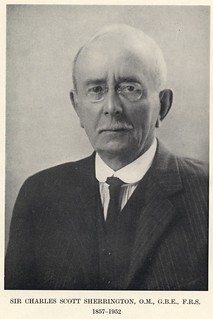 Charles S. Sherrington, Man on his Nature. 1940.
Charles S. Sherrington, Man on his Nature. 1940.
- Creation
-
Creator (Definite): Sir Charles Scott SherringtonDate: 1940
- Current Holder(s)
-
 Charles S. Sherrington, Man on his Nature. 1940.
Charles S. Sherrington, Man on his Nature. 1940.

- No links match your filters. Clear Filters
-
Related to
 Speculation regarding the future evolution of mind (c.1850-1940)
Speculation regarding the future evolution of mind (c.1850-1940)
Description:'History has set down much concerning say the last 8000 years. But a past which counts in millions of years can supply a broader criteria as to what it is to be. Is 8000 years a perspective long enough to disclose reliably a general trend of our past, to forecast our future by it?
If, as is sometimes said, history is the tracing of past purposes, here [in the history of the evolution of the earth] is a history which might, while telling of past purposes, whisper to us of future purpose. It would seem so to whisper to us, to whisper that we have been Earth's purpose. We must not let that flatter us too far. It adds 'not as an end but as a means to a further end'.' (252)
'The planet has... latterly become a place of thinking. More, it now harbours mind which recognizes values as 'values'. It is a planet now with hopes and fears and tentative 'right' and 'wrong'. A planet which is human. What will be to follow? Our human spectator watching his mother-earth believes that there will come forth from her side more mind, and still more mind. In believing this, he is not doubtful of the gearing together of energy and mind.' (254)
'Altruism has to grow. It is not enough for Man to deplore. That is less to mend things than to run from them. A positive charity is wanted; passive negation is not enough. In effect it needs a soul-growth which shall open out a higher self. That asks of the biological an unusual and even a perilously unnatural step. That [sic] might be endangered by altruism, the poise of biological sacredness of the self, the point d'appui of 'zest-to-live'.' (281)
'Evolution has constantly dealt with the relation between bodily and mental as more than mere analogy. It is altruism as passion. It marks, we may think, at the present time the climax of mind. It is well to note it is not essentially rational. It is often more germane to emotion than to intellect. It belongs, if you willl, to sentiment, and it can elevate sentiment so that intellect at best ranks as a tool for sentiment. It creates a reasoned emotion. It may have the conquest of the world before it, in which case reason will play its part, as a tool. It may mean a human future led by womankind more eminently than by men. There rises to the lips, a little wantonly, the simile of a bird brain with human cortex appende, a birds mind with human intelligence attached. And we remember the true bird-mind is of newer type than our own.
Taking nature broadly, altruism as yet has little place there. Are the shoal and th eherd altruism? Nevertheless, if our new-found civilizations tell us anything, human altruism is growing. Perhaps the highest mass-product of man's civilized society has been the 'human' peace, such as it is, within its border. Peace, though not altruism pure, is yet greater opportunity for greater altruism. Altruistic sympathy as permeating peoples may be small as yet; but, as the periods of the planetreckon, civilization itself is young. If in the past teh cohesion of the families changed the whole outlook of life upon the planet, shall not the wider cohesion of individual lives carry the transformation further, with such consequences to the flowering of life as beggar our fancy to conceive?
Ah Love! could thou and I with Fate conspire
To grasp this sorry Scheme of Things entire,
Would not we shatter it to bits - and then
Re-mould it nearer to the Heart's Desire!
There spings in him a spirit of insurrection. Standing on his planet he, its own product, harbours rebellion against the process which has enthroned him. Mind awakened by distress of mind. His altruism is in bud.' (282-283)
'This world with all its sweep of content and extent taxes utterance to indicate. Yet it is given us in so far as to seize it, and as one coherent harmony. More; it is revealing to us the 'values', as Truth, Charity, Beauty. Surely these are compensation to us for much. And will not this compensation grow? Charity will grow; Truth grows; and even as Truth so Beauty. Music as her ear grows finer embraces what were once discords. The mind which began by being one thing has truly - as so often in evolution - gone on to being another thing.' (292)
[pp. from 2nd ed., 1951]






